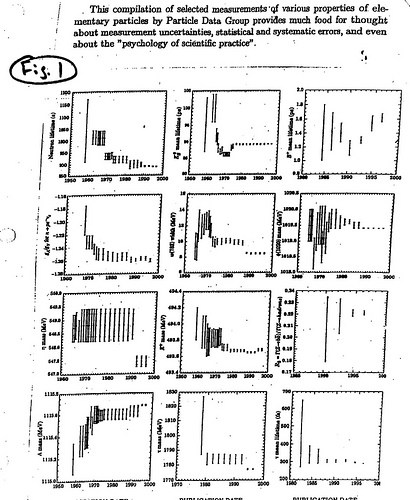
Ten commandments for a scientist.
A list of ten things every scientist should do.
Moses reached upon Mt. Sinai and was given the gift of the Ten Commandments which have dictated the fundamental rules of life ever since. Scrawled on the back of the Ten Commandments was actually another set of commandments that determined the virtuousness of science and the held commandments to follow when Moses led his people to the promised land to live fruitfully in the pursuit of scientific knowledge.
I. Thou shalt always vortex thy cells.
Often times suspensions contain elements of variable densities. Even after short periods of time, gravity causes denser particles to migrate toward the bottom of the container. This principle imbues that the distribution of a medium should be completely uniform before pipetting and measuring. The consequences of ignorance of the first commandment could result in large systematic errors.
II. Thou shalt never fabricate experimental evidence.
Science is the search for knowledge, and knowledge is the truth of the universe. By fabricating information about a research project, the scientist is violating the foundation of science itself. The consequences of this commandment will result in the revocation of the scientist’s reputability and status.
III. Thou shalt sanitize thy work bench
This commandment ensures that no experiment will be conducted with error of contamination. The lab bench should always be cleansed with ethanol and Bunson burners should be used to sanitize the tops of bottles when they are opened. Keeping organized may will be inherent in this commandment as well. Searching for something delays much time that could be spent working on hypothesis or experiments. Cleanliness further enables a scientist to undergo optimal scientific activity.
IV. Thy safety goggles shalt be worneth when thou workst with chemicals
Even if the safety goggles are not needed, because of blindness or lack of eyeballs, the safety goggles should be worn. This commandment is not just meant to keep your eyes safe form the harmful chemicals. This commandment was put into place to insure that everything you look at will be seen through a pair of safety glasses. The safety glasses are to insure that your intuition is to automatically create a safe and productive research atmosphere. The glass in which you view the world should be a glass reveals safety. V. Labels shalt be adhered to containers
Countless test tubes and containers are used every day containing a variety of different colonies or substances. To keep experiments from contamination the correct labels should clearly dictate what any container holds. Writing of the date will imply the correct calculations when performing a time variant experiment.
VI. Thou shalt keepeth a lab notebook
No memory is infallible. In order to maximize progress, a lab notebook should be established to inform one’s self and others on the progress of a research campaign. The lack of a notebook can cause confusion or failure of a experiment.
VII. Thou shalt doubteth everything.
To a certain extent, a good researcher should doubt everything, with emphasis on presently accepted ideas. Throughout the 17th and 18th century, science had to feud with the rule of the church. Eventually the church doctrine backed down and allowed science to advance. However, today we are still restrained by our absolute faith in the past.

This image shows measurements made on types of particles and the error from past publications. Notice that the measurement and error stays constant and suddenly changes abruptly. This abrupt change is because the experiment did not attempt to conform to previous methods.
Experiments can be carried out endlessly. Tweaking the experiment over and over to get the same result as a previous publication will only dampen the progress of science. Consider the previous publications heavily, but doubt constantly.
VIII. Thou shalt not talk fast.
Think before talking. Make sure you understand the concept in your head clearly so it can be verbalized to someone else. The teacher benefits from a deeper understanding of the concept and the student benefits from having the idea explained concisely and slowly. Use measured words when talking. Don’t let your mouth become plagued by garrulousness.
IX. Haste makes waste.
Scribbling in a lab notebook or scrawled labels will make life difficult later. Sloppy experiments create irreproducible results, and makes a waste of time for the whole lab. It is possible to be timely and organized. A mistake which is an accident can result in a new discovery. A mistake which is caused by rushing to put out results will almost always result in a waste of materials and time. Patience is the key virtue for this commandment.
X. Thou shalt enjoy life
This commandment is possibly the hardest to maintain. The tenth commandment deems having a healthy lifestyle, which equates to eating all the basic food groups in their respective weights, regular exercise, and reading the comics in the newspaper every day. Keep everything in moderation.